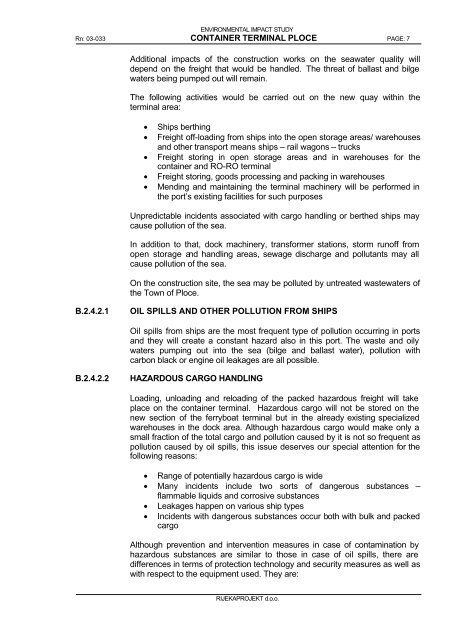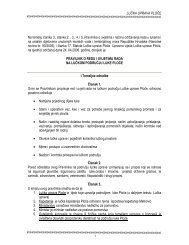HEADING PAGE - port of ploce authority * welcome
HEADING PAGE - port of ploce authority * welcome
HEADING PAGE - port of ploce authority * welcome
You also want an ePaper? Increase the reach of your titles
YUMPU automatically turns print PDFs into web optimized ePapers that Google loves.
ENVIRONMENTAL IMPACT STUDY<br />
Rn: 03-033 CONTAINER TERMINAL PLOCE <strong>PAGE</strong>: 7<br />
Additional impacts <strong>of</strong> the construction works on the seawater quality will<br />
depend on the freight that would be handled. The threat <strong>of</strong> ballast and bilge<br />
waters being pumped out will remain.<br />
The following activities would be carried out on the new quay within the<br />
terminal area:<br />
• Ships berthing<br />
• Freight <strong>of</strong>f-loading from ships into the open storage areas/ warehouses<br />
and other trans<strong>port</strong> means ships – rail wagons – trucks<br />
• Freight storing in open storage areas and in warehouses for the<br />
container and RO-RO terminal<br />
• Freight storing, goods processing and packing in warehouses<br />
• Mending and maintaining the terminal machinery will be performed in<br />
the <strong>port</strong>’s existing facilities for such purposes<br />
Unpredictable incidents associated with cargo handling or berthed ships may<br />
cause pollution <strong>of</strong> the sea.<br />
In addition to that, dock machinery, transformer stations, storm run<strong>of</strong>f from<br />
open storage and handling areas, sewage discharge and pollutants may all<br />
cause pollution <strong>of</strong> the sea.<br />
On the construction site, the sea may be polluted by untreated wastewaters <strong>of</strong><br />
the Town <strong>of</strong> Ploce.<br />
B.2.4.2.1 OIL SPILLS AND OTHER POLLUTION FROM SHIPS<br />
Oil spills from ships are the most frequent type <strong>of</strong> pollution occurring in <strong>port</strong>s<br />
and they will create a constant hazard also in this <strong>port</strong>. The waste and oily<br />
waters pumping out into the sea (bilge and ballast water), pollution with<br />
carbon black or engine oil leakages are all possible.<br />
B.2.4.2.2 HAZARDOUS CARGO HANDLING<br />
Loading, unloading and reloading <strong>of</strong> the packed hazardous freight will take<br />
place on the container terminal. Hazardous cargo will not be stored on the<br />
new section <strong>of</strong> the ferryboat terminal but in the already existing specialized<br />
warehouses in the dock area. Although hazardous cargo would make only a<br />
small fraction <strong>of</strong> the total cargo and pollution caused by it is not so frequent as<br />
pollution caused by oil spills, this issue deserves our special attention for the<br />
following reasons:<br />
• Range <strong>of</strong> potentially hazardous cargo is wide<br />
• Many incidents include two sorts <strong>of</strong> dangerous substances –<br />
flammable liquids and corrosive substances<br />
• Leakages happen on various ship types<br />
• Incidents with dangerous substances occur both with bulk and packed<br />
cargo<br />
Although prevention and intervention measures in case <strong>of</strong> contamination by<br />
hazardous substances are similar to those in case <strong>of</strong> oil spills, there are<br />
differences in terms <strong>of</strong> protection technology and security measures as well as<br />
with respect to the equipment used. They are:<br />
RIJEKAPROJEKT d.o.o.



